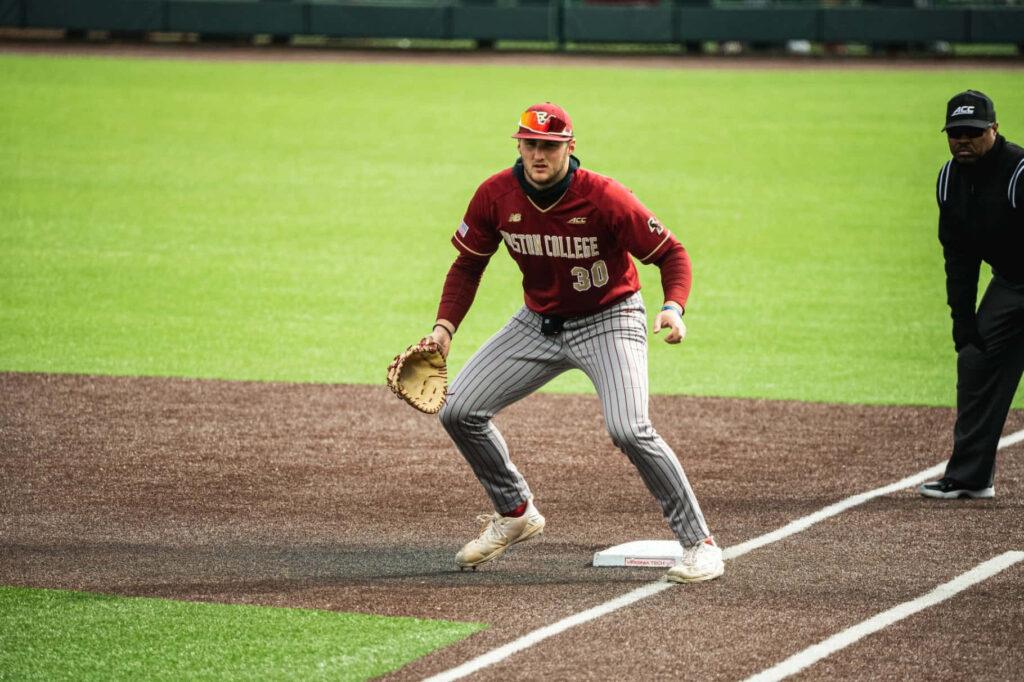
A Boston College athlete takes a defensive stance at first base during a game.
The NCAA recently agreed to a historic $303 million settlement in a class action antitrust lawsuit that accused the organization of illegal wage fixing. This settlement represents approximately 7,700 volunteer coaches across Division I athletics who were prohibited from receiving compensation from their respective schools. However, there’s a notable exclusion that directly impacts college baseball fans: volunteer coaches in baseball programs are not included in this settlement.
Understanding the Settlement’s Scope
The landmark settlement covers volunteer coaches who worked for NCAA Division I athletic programs between March 17, 2019, and June 20, 2023. The proposed settlement agreement noted that “many class members will receive a six-figure amount,” providing significant financial compensation for coaches who were previously restricted from earning wages despite their substantial contributions to their programs.
These volunteer coaches played crucial roles in recruiting, player development, and program operations across various sports. They often worked full-time schedules while being legally prohibited from receiving any compensation from their universities due to NCAA regulations that the lawsuit alleged constituted illegal wage fixing under antitrust law.
The Baseball Exception: Why College Baseball Coaches Are Excluded
The most significant aspect of this settlement for college baseball fans is what’s missing: baseball programs. The settlement specifically excludes volunteer coaches from baseball, leaving them without recourse through this particular legal action. This exclusion stems from baseball’s unique legal position in American sports.
Baseball enjoys a longstanding antitrust exemption established by the Supreme Court in 1922 through Federal Baseball Club v. National League. This exemption remains “an anomaly among the otherwise uniform application of antitrust law to sports leagues,” as legal experts recently noted in discussions about whether the Supreme Court might finally overturn this century-old precedent.
This exemption complicates antitrust litigation involving baseball at all levels, including college baseball. While other sports programs’ volunteer coaches could successfully argue that NCAA restrictions violated antitrust laws, baseball’s special legal status creates different legal pathways and challenges.
Impact on College Baseball Programs
The exclusion of baseball from this settlement has significant implications for college baseball programs and their coaching structures. While volunteer coaches in football, basketball, soccer, and other sports may receive substantial six-figure payouts, their baseball counterparts remain in the same position they occupied before the lawsuit began.
This disparity could affect how college baseball programs structure their coaching staffs moving forward. Programs may need to find alternative ways to compensate volunteer coaches or risk losing talented individuals to other sports where such restrictions no longer apply following the settlement.
The timing is particularly significant as college athletics continues to evolve rapidly. This settlement comes on the heels of the NCAA’s $2.8 billion settlement agreement to compensate athletes for lost opportunities to benefit from their name, image and likeness, and to allow schools to share revenue with athletes.
What This Means for the Future
The settlement represents part of a broader trend of successful antitrust challenges against the NCAA. The organization has faced mounting legal pressure to justify restrictions that courts have increasingly viewed as anticompetitive. For college baseball, however, the path forward remains more complex due to the sport’s unique legal protections.
College baseball programs may need to explore creative solutions for supporting their volunteer coaching staff. This could include seeking changes to NCAA regulations specific to baseball, pursuing separate legal challenges that account for baseball’s antitrust exemption, or finding alternative compensation structures that comply with current rules.
The settlement also highlights the ongoing transformation of college athletics’ economic model. As schools gain more flexibility in compensating athletes and coaches in most sports, baseball programs may find themselves at a competitive disadvantage if they cannot offer similar opportunities to their coaching staffs.
Looking Ahead
While this $303 million settlement brings justice to thousands of volunteer coaches across college athletics, it also underscores the unique challenges facing college baseball. The sport’s antitrust exemption, while protecting it in some contexts, may limit legal remedies available to coaching staff seeking fair compensation.
For college baseball fans, this development serves as a reminder of how legal precedents established over a century ago continue to shape the modern game. As the college athletics landscape continues to evolve, baseball programs will need to navigate these distinctive legal waters while competing for talent with sports that now operate under different compensation rules.
The settlement may ultimately push college baseball toward its own reckoning with coaching compensation, whether through regulatory changes, separate legal action, or legislative intervention. Until then, volunteer coaches in college baseball remain in a uniquely challenging position within the rapidly changing world of college athletics.

